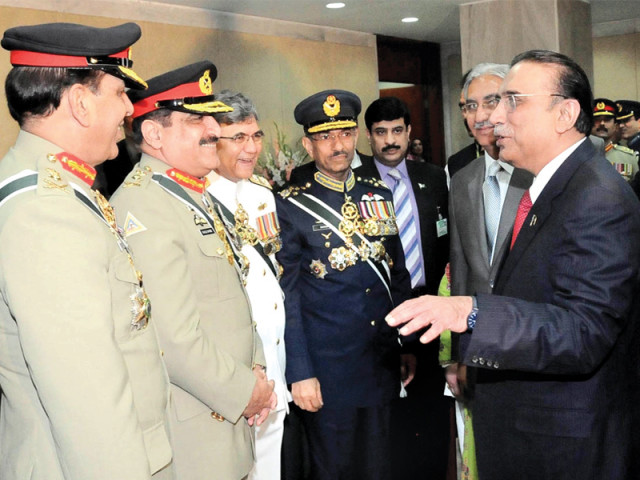Address to parliament: President makes history amidst vociferous protests
In a speech marred by PML-N sloganeering, president highlights government’s ‘achievements despite odds’.

Having already made history by addressing a full quota of addresses to a sitting government, the president on Saturday touched on another landmark exercise that will begin next week.
“Parliamentary oversight and democratic accountability is a new and important facet of [our] foreign policy,” said President Asif Ali Zardari, referring to the parliamentary review of relations with the US that will begin on Monday.
The president’s highlighting of the exercise was made in the presence of a packed diplomatic gallery and the military brass, which was also in full attendance at the joint session of Parliament, held to mark the beginning of the last parliamentary year of the current set-up.
It was a historic moment for the president and his ruling party – but, as expected, the opposition did not make it easy for them.
President Asif Ali Zardari delivered a record-setting fifth address to a joint sitting of Parliament amidst a rowdy protest by the opposition on the floor of the house – ending in a walkout about halfway through the address.
With the opposition gone, the president closed his speech by appreciating the role of the prime minister in handling the number of crises that the ruling coalition has faced, and indeed still faces, while setting these records. He also hailed the role played by the coalition partners as well as the opposition over the last four years.
For their part, the opposition Pakistan Muslim League-Nawaz (PML-N) was making up for their perceived silence over that time – shouting, full tilt, for an entire 15 minutes, before walking out. While the Jamiat Ulema-e-Islam (JUI-F) also stood up and walked out, as did a breakaway faction of PML-Quaid (the likeminded group) and the National Party Balochistan, they didn’t join the PML-N in raising slogans. The protest was over a host of issues that the opposition has complained about over the last four years – which went well with the occasion since the president’s speech was also retrospective.
The president focused on what he termed the government’s achievements during the past four years – ones that have been highlighted on a number of occasions.
Talking about the next general elections, President Zardari said that, after the 20th Amendment, which ensures an independent election commission and the setting up of an impartial caretaker set-up, the government has ensured free, fair and credible polls.
Recalling this government’s steps to make up for past neglect, he acknowledged that political reconciliation in troubled Balochistan should not only continue but must be ‘stepped up’: “We are willing to go an extra mile to engage in dialogue with our Baloch brothers.” He added that the government was determined to “respond to the aspiration of our Baloch brothers and sisters.”
Zardari once again recalled that when his party came to power four years ago, it inherited a divided nation, bedeviled by the threat of terrorism and militancy, a fragile and weakened federation, unclear roles and mandates of different institutions of the state, an altered Constitution, and economic and energy crises.
President Zardari said the 1973 Constitution had been restored. He added that, because of this, rule of law has been established and supremacy of Parliament has been assured – once again taking the time to remind parliamentarians that he had surrendered his powers to them.
He reminded that the Concurrent List had been abolished, eighteen ministries were transferred to the provinces under the devolution plan, provincial autonomy has been enhanced and the Council of Common Interests has been made fully functional during the past four years.
He said that during the last four years great strides have been taken to integrate, mainstream and develop the areas and regions that have been ignored in the past. The Political Parties Act was extended to the tribal areas. This has given more political and economic power to our tribal citizens, he added.
He, however, also admitted that there were things that the government was still struggling with – but added that these were inherited problems, such as the power crisis.
“We are trying to get out of this situation. We are taking steps that the people should know about,” he added. He claimed that, since 2008, the present government has added 3,300 Megawatts to the national grid.
He said the prime minister has laid the foundation stone of the Basha Dam project, which, he said, would produce more electricity than the combined production of Tarbela and Mangla Dams.
He said that the government has ensured that tariff for 8 million power consumers (life line consumers) were not raised during the last four years.
On the economic front, he said that despite inheriting crippling problems, and dealing with natural disasters, the government had taken “difficult decisions” to get out of a “threatening situation.”
An address by President to a joint sitting of Parliament at the onset of a new parliamentary year is a constitutional provision - but none of President Zardari’s predecessors could manage complete a full five, as the governments have not completed their tenure.
The one government that did complete its tenure was a military-backed set up, which operated under the reign of Gen Pervez Musharraf from 2002 to 2007. However, even Gen Musharraf only addressed Parliament on one occasion – fearing a strong reaction by opposition parties, such as the one witnessed during his maiden address.
Published in The Express Tribune, March 18th, 2012.



















COMMENTS
Comments are moderated and generally will be posted if they are on-topic and not abusive.
For more information, please see our Comments FAQ